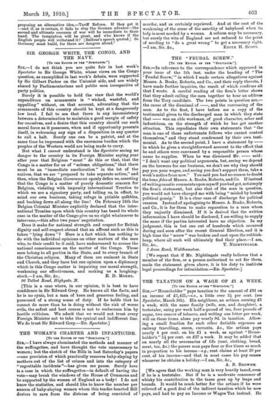SIR GEORGE WHITE, THE CONGO, AND THE NAVY. [To THE
EDITOR or THE 8rscrsros."1 Stu,—I do not think you are quite fair in last week's Spectator to Sir George White, whose views on the Congo
question, as exemplified in last week's debate, were supported by Sir Gilbert Parker on the Unionist side, and are widely shared by Parliamentarians and public men irrespective of party politics. Surely it is possible to hold the view that the world's expenditure on armaments is " wicked, wasteful, and appalling" without, on that account, advocating that the armaments of this country should be kept at a dangerously low level. I fail to see that there is any inconsistency between a determination to maintain a good margin of safety for ourselves, and a desire that this country should use such moral force as it possesses, when and if opportunity presents itself, in welcoming any sign of a disposition in any quarter to call a halt. Surely one can be a patriot, and at the same time be impressed with the enormous burden which the peoples of the Western world are being made to carry.
But what I cannot understand is the Spectator seeing no
danger to the country in its Foreign Minister saying year after year that Belgium " must " do this or that, that the Congo is a matter for us of "solemn obligations," that there must be an "immediate amelioration" in the lot of the natives, that we are " prepared to take separate action," and then, when the Belgian Government openly defies us, asserting that the Congo is a matter of purely domestic concern for Belgium, violating with impunity international Treaties to which we are a signatory party, and telling us, in effect, to mind our own business, taking refuge in pitiable quibbles, and backing down all along the line ! On February 24th the Belgian Colonial Minister explicitly declared that the inter- national Treaties upon which this country has based its whole case in the matter of the Congo give us no right whatsoever to intervene,—this after two years' negotiation.
Does it make for national strength and respect for British
dignity and self-respect abroad that an affront such as this is taken " lying down "? Here is a fact which has nothing to do with the individual opinions on other matters of the men who, to their credit be it said, have endeavoured to arouse the national consciousness on the matter of the Congo. Those men belong to all parties in the State, and to every branch of the Christian religion. Many of them are eminent in State and Church, and they have but one opinion upon a diplomacy which in this Congo matter is impairing our moral strength, weakening our effectiveness, and making us a laughing-
stock.—I am, Sir, &c., E. D. MOREL.
96 Talbot Road, Highgate, N.
[This is a case where, in our opinion, it is best to have confidence in Sir Edward Grey. He knows all the facts, and
he is no cynic, but a man of keen and generous feeling, and possessed of a strong sense of duty. If he holds that he cannot do more than he is doing without the risk of worse evils, the safest and best course is not to embarrass him by hostile criticism. We admit that we would not trust every Foreign Minister not to take the cynical and indifferent line. We do treat Sir Edward Grey.—ED. Spectator.]










































 Previous page
Previous page